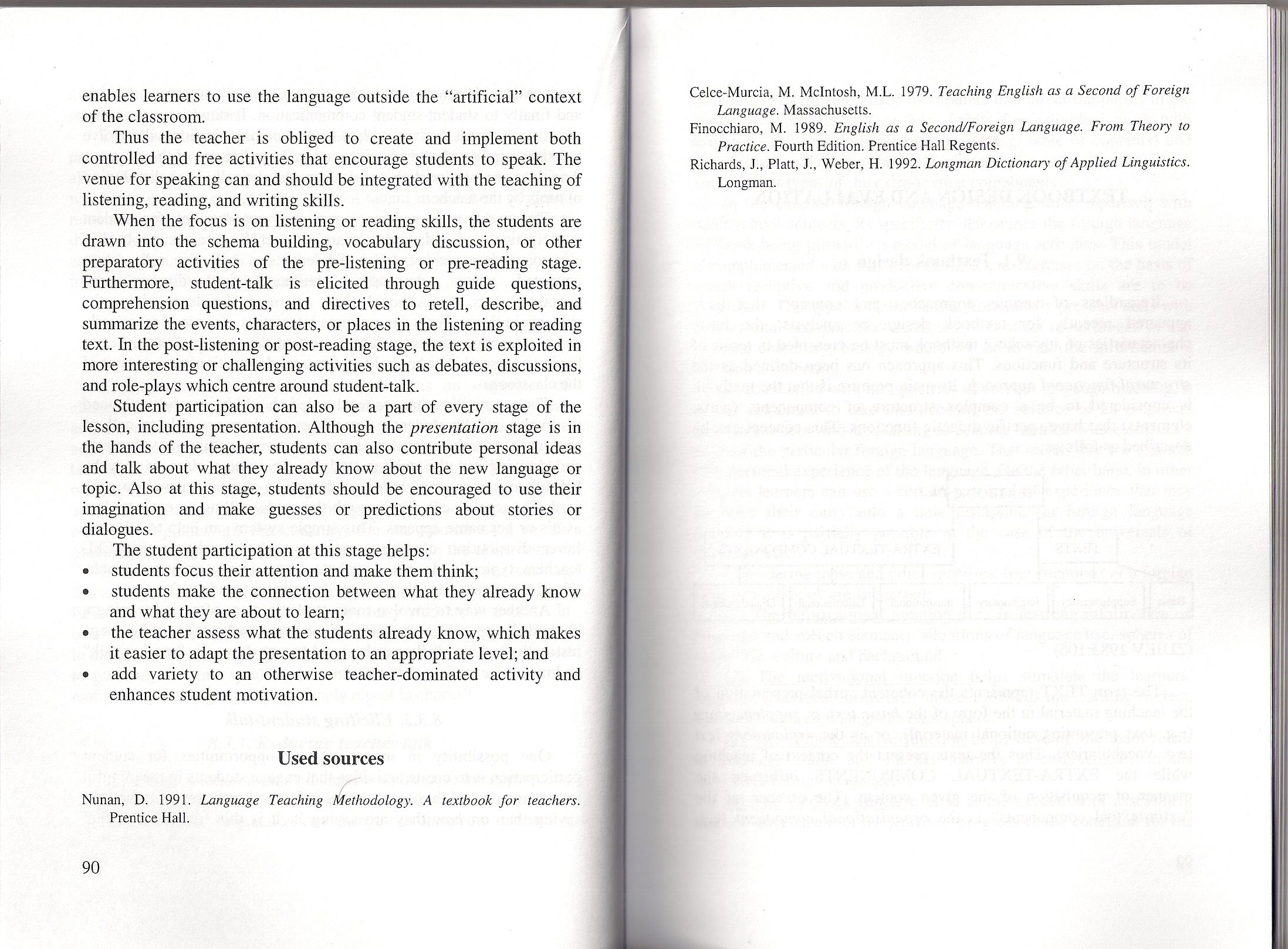65394 skanowanie0045 (8)

enables leamers to use the language outside the “artificial” context of the classroom.
Thus the teacher is obliged to create and implement both controlled and free activities that encourage students to speak. The venue for speaking can and should be integrated with the teaching of listening, reading, and writing skills.
When the focus is on listening or reading skills, the students are drawn into the schema building, vocabulary discussion, or other preparatory activities of the pre-listening or pre-reading stage. Furthermore, student-talk is elicited through guide questions, comprehension ąuestions, and directives to retell, describe, and summarize the events, characters, or places in the listening or reading text. In the post-listening or post-reading stage, the text is exploited in morę interesting or challenging activities such as debates, discussions, and role-plays which centre around student-talk.
Student participation can also be a part of every stage of the lesson, including presentation. Although the presentation stage is in the hands of the teacher, students can also contribute personal ideas and talk about what they already know about the new language or topie. Also at this stage, students should be encouraged to use their imagination and make guesses or predictions about stories or dialogues.
The student participation at this stage helps:
• students focus their attention and make them think;
• students make the connection between what they already know and what they are about to leam;
• the teacher assess what the students already know, which makes it easier to adapt the presentation to an appropriate level; and
• add variety to an otherwise teacher-dominated activity and enhances student motivation.
Used sources
Nunan, D. 1991. Language Teaching Methodology. A textbook for teaćhers. Prentice Hall.
Celce-Murcia, M. Mclntosh, M.L. 1979. Teaching English as a Second ofForeign Language. Massachusetts.
Finocchiaro, M. 1989. English as a Second/Foreign Language. From Theory to Practice. Fourth Edition. Prentice Hall Regents.
Richards, J., Platt, J., Weber, H. 1992. Longman Dictionary of Applied Linguistics. Longman.
Wyszukiwarka
Podobne podstrony:
skanowanie0045 (8) enables leamers to use the language outside the “artificial” context of the class
Enable InnoDB Memcached Binary Log with innodb_api_enable_binlog: •To use the InnoDB memcached plugi
da: Teaching How To Use The• Language • Dont teach how to use Ad
skanowanie0107 (2) 12.4.5. Keys to teaching the writing skills A number of things
INTRODUCTIONThis textbook explains how to use the Ethernet module QJ71E71 of MELSEC-Q series and its
2. The New Zealand Table of Allocations2.1 How to use the Table The New Zealand Table of Allocations
skanowanie0107 (2) 12.4.5. Keys to teaching the writing skills A number of things
skanowanie0107 (2) 12.4.5. Keys to teaching the writing skills A number of things
40 Mirosław Gerigk be applied. It is preferred to use the second approach. For the risk assessment a
portfolio settings image Images Settings These settings enable you to manage the images displayed in
Advantages and disadvantages of digital education 25 (for this purpose it is recommended to use the
Crochet Borders78 they retain their unique recogni żabie marki ngs to enable you to identify the sti
Monitoring General Database State and Workload The Database Home page enables you to monitor the Sta
Direct the slave to use the master. Instruct the slave to use the master as the replication data sou
A classic method to generate a pareto (weak pareto) optimal solution of MOLP (4) is to use the
A-YJl /^3 Gen. S. asked where and hov; did Gen. A. intend to use the Polish uorps.
18. Mehtas decision to use the term lewdness in reference to the hijras is clearly infłu-enced by th
TRANSPORT The easiest and cheapest way to move around Nowy Sącz is to use the public bus transport M
więcej podobnych podstron